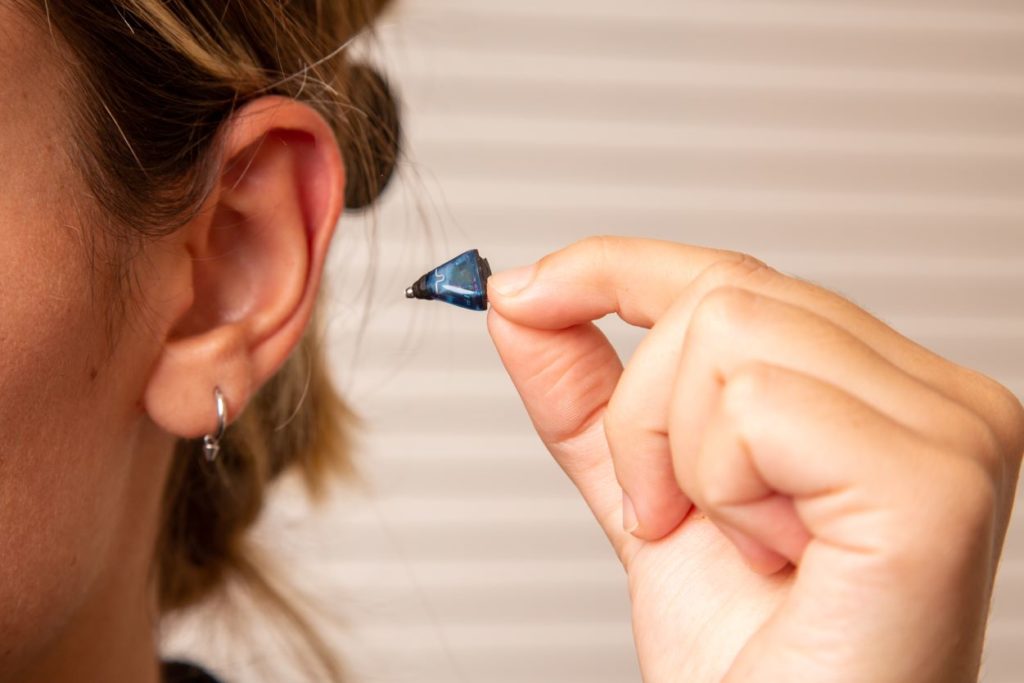Hearing loss can be a significant challenge for individuals of all ages, impacting communication, social life and overall well-being. For many people, deciding whether to opt for NHS or private hearing aids can be daunting. Both options have their advantages and disadvantages, and choosing the right path depends on your individual needs, priorities and budget.
In this blog, we’ll delve into the world of hearing aids, comparing the NHS and private options so you can make an informed decision. We’ll touch base on factors such as cost, waiting times, technology and aftercare to provide you with a comprehensive overview.
Understanding NHS hearing aids and hearing services
The NHS offers a range of hearing services including assessments, diagnosis and the provision of hearing aids. One of the main advantages of opting for NHS hearing aids is that they are free of charge, making them accessible to everyone. Additionally, they are backed by the NHS, providing a sense of security and reassurance for many people.
However, the NHS is often faced with high demand for its services, which can result in long waiting lists for appointments and hearing aids. Furthermore, the choice of hearing aid models available on the NHS may be limited compared to the private sector. While the technology offered has improved over the years, it will not be as advanced as some of the latest models available privately.

The benefits of private hearing aids
If you’re looking for a quicker solution with a wider range of options, private hearing aid providers are the way forward. As private audiologists and hearing aid dispensers, our services offer shorter waiting times for appointments and fittings, allowing you to access the support you need more rapidly.
We have a broader selection of hearing aid models, including the latest Phonak Lyric hearing aid that boasts never-seen-before technology and features, as well as other popular hearing aid brands such as Starkey, Signia and ReSound.
This can be great for individuals with specific hearing needs, or those who desire advanced functionalities such as Bluetooth, extended wear and sound enrichment to help manage tinnitus. Additionally, as private providers, we can offer a more personalised service, with dedicated audiologists who can provide tailored advice and support.
Other than fit and cosmetic appearance one of the major differences is that the NHS due to economies of scale almost exclusively fit ‘Behind the Ear’ or BTE hearing aids. These rely on sending sound from the hearing aid into the ear via a hollow tube. The acoustics involved mean that these hearing aids cannot deliver amplification above around 6000Hz, often there is a steep drop off in power after 5000Hz. Speech sounds extend up to around 8KHz and above so wearers miss out on important queues such as the difference between a ss sound and a th or ff sound. Private hearing aids usually employ ‘Receiver in the Ear’ technology which places the hearing aids speaker in the ear canal, bypassing the limitations of the hollow tube. This allows effective amplification up to around 9KHz and above, giving back access to those import speech sounds.
Of course, we can’t ignore the primary disadvantage of private hearing aids which is the cost. Depending on the type of hearing aid and any additional features, the price can vary significantly. While some people may have private health insurance that covers the cost of hearing aids, others will need to pay upfront. For those looking to spread the cost of their hearing aid over many months, we do offer flexible hearing aid finance options with GoCardless and Tabeo finance providers.
However you decide to pay, it’s essential to weigh up the potential benefits against the financial implications when considering private options.
Private vs NHS: comparing the costs
The cost of hearing aids can vary widely within the private sector, and although you do not have to pay for hearing aids with the NHS, you do have to ensure they are maintained and returned when you’re finished with them. Several factors influence the price, including the type of hearing aid, any additional features and the level of aftercare provided.
NHS hearing aids are free at the point of use on a long-term loan basis and additional charges for batteries or repairs are free of charge. However, if you were to break or lose a hearing aid, you may incur a replacement charge.
On the other hand, private hearing aid costs can range from a few hundred to several thousand pounds. But remember, here at Hearing Therapy, we do offer payment plans to help spread the cost. We also offer flexible hearing aid and ear health aftercare services and payment plans. If you’re unsure on what the best option is for you, one of our friendly staff members can discuss our options with you.

Hearing aid technology comparison
Hearing aid technology has advanced significantly in recent years, with a range of options available to suit different levels of hearing loss, different lifestyle needs and aesthetic preferences.
The main types of hearing aids include analogue, digital and smart hearing aids.
- Analogue hearing aids are the most basic type and are generally less expensive. They amplify sound but offer limited features.
- Digital hearing aids use advanced technology to process sound and provide a more natural listening experience. They often include features such as noise reduction and directional microphones.
- Smart hearing aids are the latest generation and offer connectivity with smartphones and other devices. They can also adapt to different listening environments.
While the NHS typically provides digital hearing aids, the range of models and features may be limited. As private audiologists, we provide a wider selection of the latest models of hearing aids, including invisible hearing aids and smart hearing aids.
Hearing aid aftercare and support
Both the NHS and private providers offer aftercare services, such as adjustments, repairs and counselling. However, the level of support will vary.
NHS services can be accessed at no additional cost however wait times can be long and it may be difficult to get an appointment. Whereas private hearing aid clinics will likely charge for each appointment as and when you need to be seen or will charge a subscription fee for maintenance services; which you choose is up to you.
It’s essential to consider the ongoing costs and availability of aftercare when choosing a hearing aid provider. Regular adjustments are crucial to ensure your hearing aids continue to work effectively, your hearing loss is managed and your ears remain healthy.
How to choose your hearing aid provider
Choosing between NHS and private hearing aids is a personal decision that depends on individual circumstances and preferences. The NHS offers a free service but you’ll likely be faced with longer waiting times and a limited choice of hearing aids. Private providers have the capacity to offer shorter waiting times, a wider range of hearing aids and a more personalised service, but at a higher cost.
It’s essential to weigh up the pros and cons of each option carefully and consider factors such as cost, waiting times, technology and aftercare. Consult with our expert audiologists and we’ll be happy to help you determine the best course of action for your specific needs.
Ultimately, the goal is to improve your hearing and quality of life, so choosing the right hearing aid solution is crucial. Book an appointment with us today and we’ll get you on the path to better hearing.
